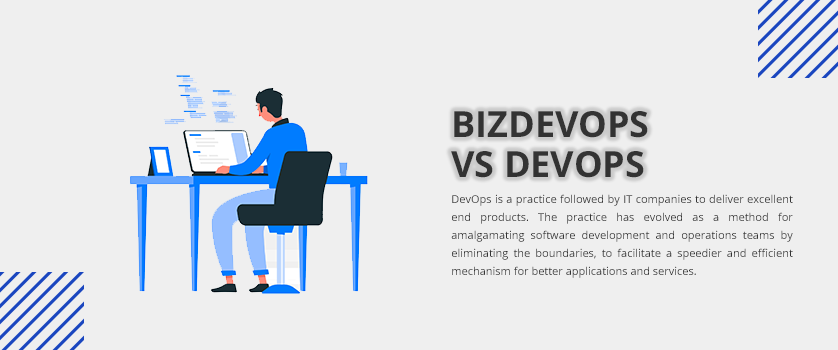
DevOps
DevOps is a practice followed by IT companies to deliver
excellent end products. The practice has evolved as a method
for amalgamating software development and operations teams by
eliminating the boundaries, to facilitate a speedier and
efficient mechanism for better applications and services.
In this fast-paced industry, where competition is always to
stay ahead of the curve, the DevOps model eliminates the
obstacles faced by the teams working in silos, in earlier
times. The term takes a different meaning as per its
application, for instance, often quality assurance teams and
security teams may collaborate with the development and
operations team. When security is the focus of the DevOps
team, the phenomenon is termed as DevSecOps.
BizDevOps
BizDevOps refers to an approach in software development that
emphasizes teamwork to increase revenue. Often termed as
DevOps 2.0, its objective is to generate value from the
software development idea, followed by a discussion with the
client to convey the importance of the conceived idea.
BizDevOps is, thus, about the collaboration between
development, operations, and business (management) teams. It
helps in aligning the steps involved in the development,
better governance, very detailed monitoring of the processes,
and improving efficiency.
Why BizDevOps?
Let us understand BizDevOps - Business, Development,
Operations
-
Business: Businesses' overall objectives are achieved as the
collaboration of teams helps in creating value, formulating
a business plan, and implementing feedback.
-
Development Teams: This team works on delivering quality software by focusing
on coding, testing, design, managing backlogs, and so on.
-
Operations: Operations team can focus on the deployment of the
application followed by monitoring and optimizing.
How to implement BizDevOps ?
As the focus revolves around benefitting the business as a
whole, any organization must take into consideration a few key
factors mentioned as follows:
-
Add up all the components (resources) that are relevant and
significant for forming a BizDevOps team. Building a team
requires grouping various business processes and tools based
on the objectives of product development. The team should
ideally consist of people from operations, marketing, and
business intelligence to discuss and derive the most out of
this platform.
-
The process of implementation begins with defining the
business problems to analyze the given plan of software
development concerning technical and budgetary constraints.
Code development is followed by test execution. Based on the
success of test results, the product is readied for
deployment post, which is monitored for its operational
efficiency in the production environment.
DevOps Vs BizDevOps
The terms are used interchangeably, the latter being the
extension of the former. The term DevOps was coined for the
first time in 2009 by Patrick Debois and is rather a
perspective on how things should be handled from a broader
perspective.
One may wonder where DevOps derive its significance? Well,
the concept evolved over time, until it was recognized and
shaped into a concrete and meaningful principle.
The two primary areas that can be attributed to
DevOps’s origin are -
-
Enterprise Systems Management (ESM):
The initial stage of DevOps comprised integration of ESM
concepts, as the stakeholders were mostly administrators,
such as system monitoring, configuration management,
automated provisioning, and similar ones.
-
Agile Development:
DevOps has somewhat shaped into its existing state because
of agile. In agile software development, the emphasis is on
continuous collaboration between product management teams,
customers, developers, and all other stakeholders involved
in the process to ensure there is no gap in end-user
expectations and the product being delivered to them.
Everything has to remain updated, be it a feature update, a
security patch update, or any similar kind of activity, to
ensure seamless functioning.
BizDevops, as we have discussed earlier is an extended
version of DevOps and termed DevOps 2.0, is simply an
extension of DevOps concepts into business as a whole, to
ensure product development contributes to the growth of the
revenue structure of an organization. Therefore, BizDevOps
is a subset of DevOps with some additional components
attached to it.
Benefits of DevOps:
DevOps aims to enhance productivity and profitability
prospects for any organization. Therefore, here we summarize
the advantages of DevOps in a few brief pointers as
follows:
-
Speed -
Keeping pace with the rapid advancements will keep the
organizations one step ahead. It is important to understand
the market structure, what user needs are and thus innovate
and fetch better revenue, adding value to the
business.
-
Rapid Delivery - competition is soaring high and therefore faster you
market, the better are your prospects at the market level.
Adoption of practices such as continuous integration and
delivery are the key to an automated outcome.
-
Scalability - managing the software development infrastructure is another
key to attain benefits. Organizations must focus on
integration efficient ‘infrastructure as code’
solutions, which is a cloud-based approach for handling
continuous integration processes, driven by APIs.
-
Better collaboration - DevOps, being a cross-functional team, will automatically
inculcate values such as ownership and accountability for
each member. Therefore, it is an efficient approach towards
easier collaboration between teams, sharing
responsibilities, thereby saving much time and effort.
-
Security - Security is very crucial to ensure no unauthorized access
is encountered that may jeopardize the application's
performance. It is crucial to implement security compliance
policies, along with various configuration management
techniques, to keep malware attacks at bay.
Conclusion
Most organizations are moving towards DevOps, as per the need
of the hour. It is important to understand the significance of
keeping pace with the dynamic market and delivering value to
the end-users. An organizations' work culture is largely
relevant in maintaining the market value and also ensuring
that the business is also benefiting from the ideas and plan
of action.


